Step By Step (2022)
Gênero : Documentário
Runtime : 52M
Director : Tadeáš Daněk
Escritor : Tadeáš Daněk
Sinopse
The popularity of the Santiago de Compostela pilgrimage continues to grow. Four Czech pilgrimage stories also inspired a new pilgrim, who has just embarked on his long journey. He steps out of his comfort zone to not only discover the magic of the pilgrimage, but also to find himself. When a pilgrim meets a pilgrim on the way to Santiago de Compostela, their first question is clear: “Where are you coming from?” Because every step counts. This is evidenced by four pilgrims’ stories: Kvakin, who came from Boskovice; Olga, who managed her own pilgrimage at an older age; Mario, whose journey summoned him on its own accord; and Peter, who was paralyzed in half his body but got up from his wheelchair and hit the road. We also follow the pilgrimage of Kamil Bartošek, better known as the entertainer and mystifier Kazma Kazmitch.

Uma homenagem ao controverso ativista negro e líder da luta pela liberação negra. Ele chegou ao fundo do poço durante seu encarceramento nos anos 50, tornou-se um muçulmano negro e, mais tarde, líder da Nação do Islã. Seu assassinato em 1965 deixou um legado de autodeterminação e orgulho racial.
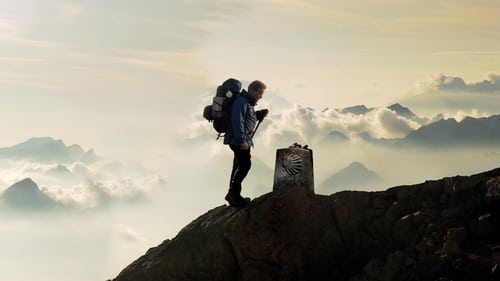
O oftalmologista Tom Avery (Martin Sheen) e seu único filho Daniel (Emilio Estevez) têm uma relação distante. Quando o rapaz viaja para a Espanha para cruzar o Caminho de Santiago de Compostela, acaba perdendo a vida em uma fatalidade. Tom, então, vai até a França para recolher o corpo de seu filho. Chegando lá, ele resolve fazer o Caminho, completando o percurso que Daniel havia começado, levando junto as cinzas do rapaz. Durante a empreitada, ele encontra companheiros que vão lhe mostrar que nenhum caminho deve ser percorrido sozinho.
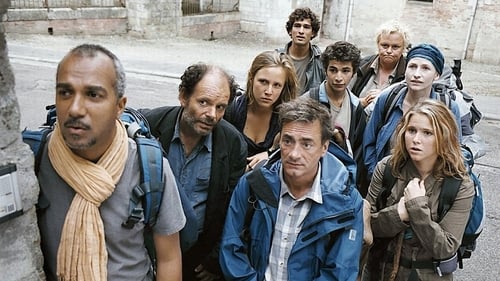
Three siblings who detest each other and hiking must complete together a pilgrimage to Santiago de Compostela in order to be eligible to inherit their mother's wealth.
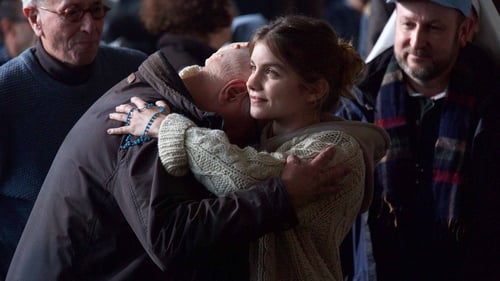
Jacques, grande repórter de um jornal francês, recebe um misterioso telefonema do Vaticano. Em um pequeno vilarejo no sudeste da França, uma jovem de 18 anos afirma ter visto a aparição da Virgem Maria. Os rumores logo se espalham, e o fenômeno toma tal dimensão que milhares de peregrinos vão se reunir no local das supostas aparições. Jacques, que não tem nada a ver com esse mundo, aceita fazer parte de uma comissão de investigação encarregada de esclarecer esses eventos.

Internationally acclaimed ventriloquist Nina Conti takes the bereaved puppets of her mentor and erstwhile lover Ken Campbell on a pilgrimage to "Venthaven" the resting place for puppets of dead ventriloquists. She gets to know her latex and wooden travelling partners along the way, and with them deconstructs herself and her lost love in this ventriloquial docu-mockumentary requiem. Ken Campbell was a hugely respected maverick of the British theatre, an eccentric genius who would snort out forgotten artforms. Nina was his protégé in ventriloquism and has been said to have reinvented the artform. This film is truly unique in genre and style. No one has seen ventriloquism like this before.
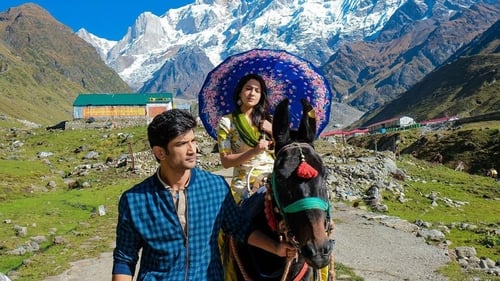
Mansoor, a reserved and reticent Pithoo (porter), helps pilgrims make an arduous journey upwards to the temple town. His world turns around when he meets the beautiful and rebellious Mukku who draws him into a whirlwind of intense love.
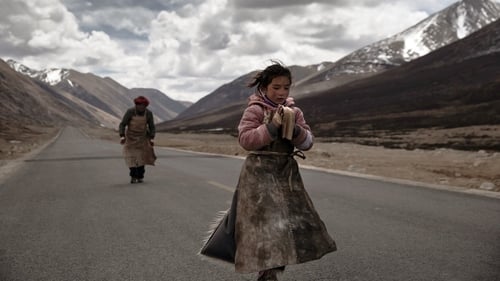
Eleven Tibetans prostrate themselves every few steps during a 1,200-mile pilgrimage that lasts for seven months.
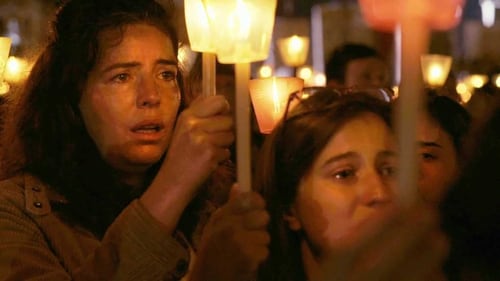
A viagem de 11 mulheres enquanto vão em peregrinação de Bragança a Fátima.

Reda, summoned to accompany his father on a pilgrimage to Mecca, complies reluctantly - as he preparing for his baccalaureat and, even more important, has a secret love relationship. The trip across Europe in a broken-down car is also the departure of his father: upon arrival in Mecca, both Reda and his father are not the characters they were at the start of the movie. Avoiding the hackneyed theme of the return to the homeland, the film uses the departure to renew a connection between two generation.

Three episodes. Faith: a woman is attacked. Hope: a fakir is crucified. Charity: a woman faces bureaucracy.
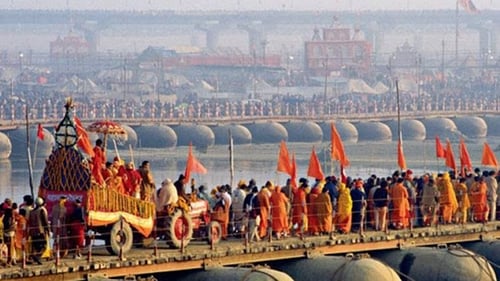
February 2013, Allahabad, India. Over the next 55 days, nearly a hundred million people will come here, to the Great Kumbh Mela. This incredible and awe-inspiring celebration of the world's oldest religion happens every 12 years at the place where Hindus believe two sacred rivers meet. For many Hindus this is their most important pilgrimage, and it happens at one of the most holy sites in India. Hindus come to cleanse themselves in the sacred waters of the river Ganges, to pray and emerge purified and renewed. This follows British pilgrims as they embark on a once-in-a-lifetime spiritual journey. A journey that will take them into the heart of Hinduism - its philosophy, its beliefs and its traditions. A journey that will culminate in the largest ever gathering of humans in one place.

A filmmaker's insight into the biggest gathering on earth -the Kumbh Mela.

Four men from a nomadic Tibetan tribe undertake their annual, ritualistic pilgrimage to a sacred salt lake. Salt gathered in this traditional fashion will be sold to provide the economic livelihood of the tribe for the coming year. The journey, necessary for the group's survival, also incorporates a number of rituals necessary for their culture to survive in the modern world.

Three tales of life on the Nile River reveal love and vengeance, religion and deception. Each atmospheric vignette offers an eye-opening take on the culture, attitudes and religion of the Middle East. First, a knife thrower's affair threatens his mistress. Then, the plague tests a band of pilgrims journeying to Mecca. Finally, two con men learn a lesson at a Coptic church.

The film documents one of the largest Indian religious fairs, the Kumbh Mela, which is held at the confluence of the rivers Ganges, Yamuna and Saraswati. The action is seen through the eyes of Shubhendu Chatterjee who has come to the Mela not out of any religious sentiment but to see and understand people and seek the reason why “….multitudes upon multitudes of the old and weak and the young and frail enter without hesitation or complaint upon such incredible journeys and endure the resultant miseries without repining.” (Mark Twain after visiting the 1895 Mela)

Abu, a poor perfume seller, lives with his wife. The couple strives hard to make an honest attempt to go for the Hajj pilgrimage.

The popularity of the Santiago de Compostela pilgrimage continues to grow. Four Czech pilgrimage stories also inspired a new pilgrim, who has just embarked on his long journey. He steps out of his comfort zone to not only discover the magic of the pilgrimage, but also to find himself. When a pilgrim meets a pilgrim on the way to Santiago de Compostela, their first question is clear: “Where are you coming from?” Because every step counts. This is evidenced by four pilgrims’ stories: Kvakin, who came from Boskovice; Olga, who managed her own pilgrimage at an older age; Mario, whose journey summoned him on its own accord; and Peter, who was paralyzed in half his body but got up from his wheelchair and hit the road. We also follow the pilgrimage of Kamil Bartošek, better known as the entertainer and mystifier Kazma Kazmitch.

TANNHÄUSER UND DER SÄNGERKRIEG AUF WARTBURG is a grand opera by Richard Wagner in three acts. After experiencing boundless sensuality and freedom with the fun-loving Venus (soprano), the singer Tannhäuser (Tenor) finds it impossible to conform to the cultured setting of his betrothed Elizabeth (soprano), who loves him. During a singing contest, Tannhäuser describes the affair with Venus as the ultimate love experience and because of that, he is cast out from the established society. Thanks to Elizabeth's intervention, he is allowed to undertake a pilgrimage to the Pope to ask for the Holy Father's pardon. If the Pope accepts to forgive him, he would be allowed to take back his place in society. Tannhäuser accepts. But fate will not allow him to meet with his beloved Elizabeth again in this life. This is a recording of the legendary staging by Götz Friedrich for the 1978 Bayreuth Festival conducted by Sir Colin Davis.
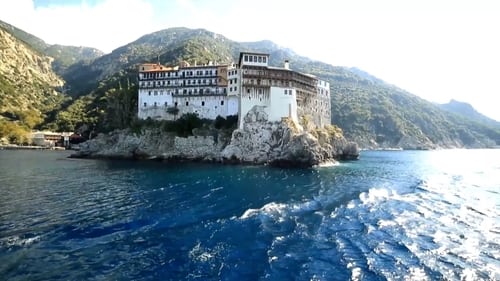
The Athos peninsula in Greece is one of Europe's last secrets. Over 2000 monks live on Athos - cut off from the outside world. Access is denied to women, tourists are not welcome. Only workers and pilgrims can obtain a visa. The "Autonomous Monastic State of the Holy Mountain" attracts people who feel like they are missing something from their modern lives. With the help of three Athos monks, "Athos - A Taste of Heaven" tells the story of the island and its inhabitants in a unique filmed diary style. The film's guiding theme is the path we as people have to find and follow - each and everyone for themselves. "First we must heal our own souls, only then we can help others", is one of Father Galaktions core messages. He lives as a hermit on the holy mountain. Not all monks, however, live as secluded and demure as Father Galaktion. The film team is also received by Father Epiphanios - a gifted and poetic cook who certainly does not disdain the pleasures of life.
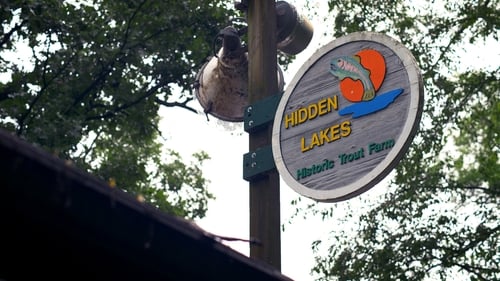
As crenças fanáticas de um místico da Internet, do líder de um culto e de um polícia velhaco são testadas durante a caça ao “Homem Escondido”, um criptídeo que anda a aterrorizar o seu subúrbio idílico.














